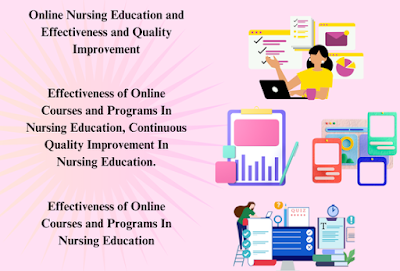The Effectiveness and Quality Improvement In Online Nursing Education. A sense of community is created through online communication, participation, and relationship-building. Instructors address the class in general terms. They communicate with students individually and engage them through thought-provoking questions.
The Effectiveness and Quality Improvement In Online Nursing Education
Extensive research into the efficacy of online courses demonstrates that student performance in these digital environments often mirrors that of traditional classroom settings (Bata Jones & Avery, 2004; Coose, 2010; Leasure, Davis, & Thievon, 2000; Leners et al., 2007; Little, 2009; Mancuso-Murphy, 2007; Mills, 2007). Coose (2010) and Mills (2007) have conducted comparative analyses of course objectives, revealing that student grades are comparable across online and physical classrooms.
Buckley (2003) observed that there was no discernible difference in educational outcomes between a conventional classroom, a web-enhanced, and a fully web-based nutrition course for undergraduate nursing students. Pullen (2006) discovered that online learning, especially in the context of ongoing professional development, not only enhanced learning and knowledge acquisition but also led to improvements in clinical practice.
A comprehensive meta-analysis by the US Department of Education highlighted various online learning strategies (Means, Toyama, Murphy, Bakia, & Jones, 2010). The findings indicated no significant disparity in student learning outcomes between purely online environments and blended learning models.
Interestingly, multimedia tools did not significantly boost online learning outcomes. Slight improvements were noted with increased student control over their learning process. Online quizzes did not correlate with enhanced results, while simulations had a modestly positive impact. The most notable gains were observed in reflective practices. The delivery platform itself did not play a significant role in the extent of learning achieved.
Further studies reveal that students express satisfaction with online learning (Billings et al., 2001) and show a preference for the online format (Wills & Stommel, 2002). De-Bourgh (2003) found that student contentment with computer-mediated distance education is closely linked to the perceived quality of instruction and instructor effectiveness.
Ali, Hodson-Carlton, and Ryan (2004) reported that graduate nursing students appreciated the flexibility and convenience of online learning, with timely feedback from faculty being a critical factor in their satisfaction.
In a study by Leners et al. (2007), doctoral students expressed satisfaction with their access to doctoral programs and their ability to continue working while enrolled.
Other research focused on the effectiveness of pedagogical practices in web-based courses. Billings et al. (2001) found that active learning strategies and substantial opportunities for interaction were positively correlated with student satisfaction, social integration, and real-world preparedness.
Leners et al. (2007) also noted that students felt they were being well-prepared for professional practice and, through online mentoring, were undergoing professional socialization. Vendeuse and Hanson (2000) discovered that faculty could enhance active learning by meticulously structuring discussion forums to foster critical thinking outcomes.
Billings et al. (2005) identified that educational practices in online courses significantly influenced outcomes, with noticeable differences in perceptions between undergraduate and graduate students.
Learning analytics involve analyzing student usage data to identify trends and patterns (New Media Consortium, 2013). One key objective is the early detection of at-risk students, enabling timely interventions to boost retention rates.
For instance, analytics might reveal that students with minimal course engagement are at a higher risk of dropping out. This can trigger alerts to faculty or advisors, prompting them to engage with the student to enhance their involvement.
Learning analytics can also facilitate customized information displays and resources tailored to individual students. Mobile applications may use these insights to guide students towards productive behaviors and successful outcomes.
Continuous Quality Enhancement in Nursing Education
In the realm of course development and teaching, it is imperative for faculty to actively seek feedback from students and colleagues to continually refine course quality (Chao, Saj, & Tessier, 2006). Gathering evaluations from students is a crucial method for assessing course effectiveness and acquiring suggestions for enhancement (refer to Chapter 26 for detailed information on course evaluation).
Peer review of online courses offers another avenue for receiving feedback on course design and its impact on student learning (Cobb, Billings, Mays, & Canty-Mitchell, 2001). Peer review can include informal assessments by colleagues, integrating their recommendations for improvement.
Zsohar and Smith (2008) propose that peer reviewers should possess both online teaching experience and content expertise, utilizing pre-established criteria for course evaluation.
Alternatively, inviting colleagues from other disciplines with online teaching experience to review the course can provide valuable insights. More formal reviews occur when peers evaluate courses for promotion, tenure, or teaching awards.
Nurse educators should continuously monitor the effectiveness of technology use, educational practices in online learning environments, and the outcomes of online courses and programs.
Embracing new learning environments will persistently challenge existing assumptions about teaching and learning, ultimately leading to improved pedagogical practices.
Online learning has become a widely accepted educational method in nursing education. While evidence consistently shows that online courses are as effective as traditional on-campus courses, the focus has now shifted towards identifying best practices for designing fully web-based and blended courses. This includes optimizing the mix of classroom and online learning experiences, leveraging emerging technologies, and crafting, implementing, and evaluating online courses and programs to enhance student learning.
Nurse educators continue to lead in the implementation of online education, remaining at the forefront of discovering best practices for the design, execution, and evaluation of online courses and programs.
Read More:
https://nurseseducator.com/didactic-and-dialectic-teaching-rationale-for-team-based-learning/
https://nurseseducator.com/high-fidelity-simulation-use-in-nursing-education/
First NCLEX Exam Center In Pakistan From Lahore (Mall of Lahore) to the Global Nursing
Categories of Journals: W, X, Y and Z Category Journal In Nursing Education
AI in Healthcare Content Creation: A Double-Edged Sword and Scary
Social Links:
https://www.facebook.com/nurseseducator/
https://www.instagram.com/nurseseducator/
https://www.pinterest.com/NursesEducator/
https://www.linkedin.com/in/nurseseducator/
https://www.researchgate.net/profile/Afza-Lal-Din
https://scholar.google.com/citations?hl=en&user=F0XY9vQAAAAJ
